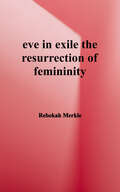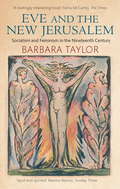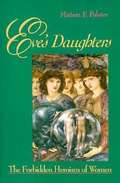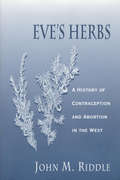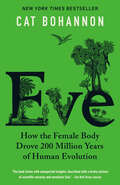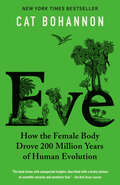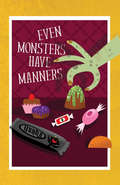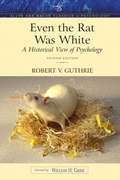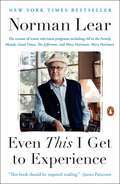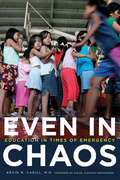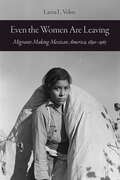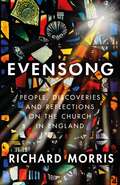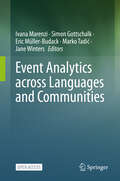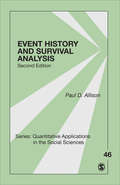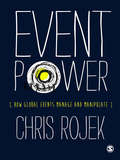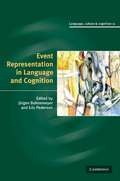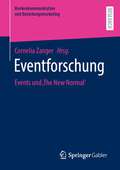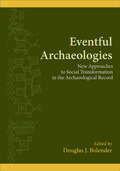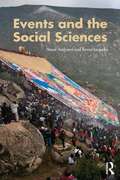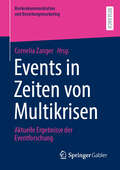- Table View
- List View
Eve In Exile: And the Restoration of Femininity
by Rebekah MerkleThe swooning Victorian ladies and the 1950s housewives genuinely needed to be liberated. That much is indisputable. So, First-Wave feminists held rallies for women's suffrage. Second-Wave feminists marched for Prohibition, jobs, and abortion. Today, Third-Wave feminists stand firmly for nobody's quite sure what. But modern women -- who use psychotherapeutic antidepressants at a rate never before seen in history -- need liberating now more than ever. The truth is, feminists don't know what liberation is. They have led us into a very boring dead end. Eve in Exile sets aside all stereotypes of mid-century housewives, of China-doll femininity, of Victorians fainting, of women not allowed to think for themselves or talk to the men about anything interesting or important. Once those fictionalized stereotypes are out of the way -- whether they're things that make you gag or things you think look pretty fun -- Christians can focus on real women. What did God make real women for?
Eve and the New Jerusalem: Socialism and Feminism in the Nineteenth Century
by Barbara TaylorA new edition of Barbara Taylor's classic book, with a new introduction.In the early nineteenth century, radicals all over Europe and America began to conceive of a 'New Moral World', and struggled to create their own utopias, with collective family life, communal property, free love and birth control. In Britain, the visionary ideals of the Utopian Socialist, Robert Owen, attracted thousands of followers, who for more than a quarter of a century attempted to put theory into practice in their own local societies, at rousing public meetings, in trade unions and in their new Communities of Mutual Association.Barbara Taylor's brilliant study of this visionary challenge recovers the crucial connections between socialist aims and feminist aspirations. In doing so, it opens the way to an important re-interpretation of the socialist tradition as a whole, and contributes to the reforging of some of those early links between feminism and socialism.
Eve's Daughters: The Forbidden Heroism of Women
by Miriam F. Polster"Heroic acts of women throughout history have been ignored, misinterpreted, and maligned. For example, Miriam Polster contrasts the condemnation of Eve with the admiration for Prometheus, although each defied the gods and gave humanity knowledge. Polster reveals that our understanding of heroism in society is entrenched in archaic male archetypes that are potentially destructive and often irrelevant to our daily lives. " "Offering a positive approach to the psychology of women, Polster explains why we must celebrate the heroism of women, from Eve to the champions of everyday life - the single mother in night school, the female scientist in a male-dominated field, the victim of harassment demanding justice. Drawing on case examples from her private practice as well as mythology, biblical commentary, and anthropology, she shows how a different, unheralded kind of heroism - the heroism of women - is more attuned to the real social and psychological needs of women, men, and children today. " "Polster shows how women and men, in confronting their own daily struggles, need not be limited to stereotypical male heroism, but can rely on their innate and unique strengths and qualities - as women heroes have done for centuries - to embody true heroism, achieve goals, and realize self-fulfillment. "--BOOK JACKET. Title Summary field provided by Blackwell North America, Inc. All Rights Reserved
Eve's Herbs: A History of Contraception and Abortion in the West
by John M. RiddleIn Contraception and Abortion from the Ancient World to the Renaissance, John Riddle showed, through extraordinary scholarly sleuthing, that women from ancient Egyptian times to the fifteenth century had relied on an extensive pharmacopoeia of herbal abortifacients and contraceptives to regulate fertility. In Eve's Herbs, Riddle explores a new question: If women once had access to effective means of birth control, why was this knowledge lost to them in modern times? Beginning with the testimony of a young woman brought before the Inquisition in France in 1320, Riddle asks what women knew about regulating fertility with herbs and shows how the new intellectual, religious, and legal climate of the early modern period tended to cast suspicion on women who employed "secret knowledge" to terminate or prevent pregnancy. Knowledge of the menstrual-regulating qualities of rue, pennyroyal, and other herbs was widespread through succeeding centuries among herbalists, apothecaries, doctors, and laywomen themselves, even as theologians and legal scholars began advancing the idea that the fetus was fully human from the moment of conception. Drawing on previously unavailable material, Riddle reaches a startling conclusion: while it did not persist in a form that was available to most women, ancient knowledge about herbs was not lost in modern times but survived in coded form. Persecuted as "witchcraft" in centuries past and prosecuted as a crime in our own time, the control of fertility by "Eve's herbs" has been practiced by Western women since ancient times.
Eve: How the Female Body Drove 200 Million Years of Human Evolution
by Cat BohannonAn ambitious, eye-opening, myth-busting and groundbreaking history of the evolution of the female body, by a brilliant new researcher and writer.Why do women live longer than men? Why do women have menopause? Why are women more likely to get Alzheimer&’s? Why do girls score better at every academic subject than boys until puberty, when suddenly their scores plummet? And does the female brain really exist?In Eve, Cat Bohannon answers questions scientists should have been addressing for decades. With boundless curiosity and sharp wit, she covers the past 200 million years to explain the specific science behind the development of the female sex. Eve is not only a sweeping revision of human history, it&’s an urgent and necessary corrective for a world that has focused primarily on the male body for far too long. Bohannon&’s findings, including everything from the way C-sections in the industrialized world are rearranging women&’s pelvic shape to the surprising similarities between pus and breast milk, will completely change what you think you know about evolution and why Homo sapiens have become such a successful and dominant species, from tool use to city building to the development of language.A 21st-century update of Our Bodies, Ourselves, Eve offers a true paradigm shift in our thinking about what the female body is and why it matters.
Eve: How the Female Body Drove 200 Million Years of Human Evolution
by Cat Bohannon&“A page-turning whistle-stop tour of mammalian development that begins in the Jurassic Era, Eve recasts the traditional story of evolutionary biology by placing women at its center…. The book is engaging, playful, erudite, discursive and rich with detail." —The New York Times&“A smart, funny, scientific deep-dive into the power of a woman&’s body, Eve surprises, educates, and emboldens.&”—Bonnie Garmus, #1 New York Times best-selling author of Lessons in ChemistryAn ambitious, eye-opening, myth-busting and groundbreaking history of the evolution of the female body, by a brilliant new researcher and writerWhy do women live longer than men? Why do women have menopause? Why are women more likely to get Alzheimer&’s? Why do girls score better at every academic subject than boys until puberty, when suddenly their scores plummet? And does the female brain really exist?In Eve, Cat Bohannon answers questions scientists should have been addressing for decades. With boundless curiosity and sharp wit, she covers the past 200 million years to explain the specific science behind the development of the female sex. Eve is not only a sweeping revision of human history, it&’s an urgent and necessary corrective for a world that has focused primarily on the male body for far too long. Bohannon&’s findings, including everything from the way C-sections in the industrialized world are rearranging women&’s pelvic shape to the surprising similarities between pus and breast milk, will completely change what you think you know about evolution and why Homo sapiens have become such a successful and dominant species, from tool use to city building to the development of language.A 21st-century update of Our Bodies, Ourselves, Eve offers a true paradigm shift in our thinking about what the female body is and why it matters.
Eve: How the Female Body Drove 200 Million Years of Human Evolution
by Cat BohannonNEW YORK TIMES BESTSELLER • WOMEN'S PRIZE FOR NON-FICTION FINALIST • THE REAL ORIGIN OF OUR SPECIES: a myth-busting, eye-opening landmark account of how humans evolved, offering a paradigm shift in our thinking about what the female body is, how it came to be, and how this evolution still shapes all our lives today &“A page-turning whistle-stop tour of mammalian development that begins in the Jurassic Era, Eve recasts the traditional story of evolutionary biology by placing women at its center…. The book is engaging, playful, erudite, discursive and rich with detail." —Sarah Lyall, The New York Times &“A smart, funny, scientific deep-dive into the power of a woman&’s body, Eve surprises, educates, and emboldens.&”—Bonnie Garmus, #1 New York Times best-selling author of Lessons in Chemistry How did the female body drive 200 million years of human evolution? • Why do women live longer than men? • Why are women more likely to get Alzheimer&’s? • Why do girls score better at every academic subject than boys until puberty, when suddenly their scores plummet? • Is sexism useful for evolution? • And why, seriously why, do women have to sweat through our sheets every night when we hit menopause? These questions are producing some truly exciting science – and in Eve, with boundless curiosity and sharp wit, Cat Bohannon covers the past 200 million years to explain the specific science behind the development of the female sex: &“We need a kind of user's manual for the female mammal. A no-nonsense, hard-hitting, seriously researched (but readable) account of what we are. How female bodies evolved, how they work, what it really means to biologically be a woman. Something that would rewrite the story of womanhood. This book is that story. We have to put the female body in the picture. If we don't, it's not just feminism that's compromised. Modern medicine, neurobiology, paleoanthropology, even evolutionary biology all take a hit when we ignore the fact that half of us have breasts. So it's time we talk about breasts. Breasts, and blood, and fat, and vaginas, and wombs—all of it. How they came to be and how we live with them now, no matter how weird or hilarious the truth is.&” Eve is not only a sweeping revision of human history, it&’s an urgent and necessary corrective for a world that has focused primarily on the male body for far too long. Picking up where Sapiens left off, Eve will completely change what you think you know about evolution and why Homo sapiens has become such a successful and dominant species.
Even Monsters Have Manners
by Janna King Anna ChambersEight monster pals living in the town of Freaksterville reveal that they are surprisingly polite. In the Even Monsters series, we discover that remarkable manners are just one way these monsters are just like us! Rollicking verse and crazy cute monsters doing what monsters do come together to help underscore lessons about behavior.
Even The Rat Was White: A Historical View Of Psychology
by Robert V. GuthrieEven the Rat Was White views history from all perspectives in the quest for historical accuracy. Histories and other background materials are presented in detail concerning early African-American psychologists and their scientific contributions, as well as their problems, views, and concerns of the field of social psychology. Archival documents that are not often found in mainstream resources are uncovered through the use of journals and magazines, such as the Journal of Black Psychology, the Journal of Negro Education, and Crisis. <p><p> The text is divided into three parts. Part I, “Psychology and Racial Differences,” expands and updates historical materials that helped form racial stereotypes and negative views towards African-Americans. Part II, “Psychology and Psychologists,” is updated with specifics of what and how psychology was taught in the pre-1970 Black colleges, and brings forward the contributions of Black psychologists. Part III, “Conclusion,” discusses the implication of the previous chapters and the impact of new historical information on the field of psychology.
Even This I Get to Experience
by Norman Lear"This is, flat out, one of the best Hollywood memoirs ever written... An absolute treasure." --Booklist (STARRED)<P> In my ninety-plus years I've lived a multitude of lives. In the course of all these lives, I had a front-row seat at the birth of television; wrote, produced, created, or developed more than a hundred shows; had nine on the air at the same time; founded the 300,000-member liberal advocacy group People For the American Way; was labeled the "no. 1 enemy of the American family" by Jerry Falwell; made it onto Richard Nixon's "Enemies List"; was presented with the National Medal of the Arts by President Clinton; purchased an original copy of the Declaration of Independence and toured it for ten years in all fifty states; blew a fortune in a series of bad investments in failing businesses; and reached a point where I was informed we might even have to sell our home. Having heard that we'd fallen into such dire straits, my son-in-law phoned me and asked how I was feeling. My answer was, "Terrible, of course," but then I added, "but I must be crazy, because despite all that's happened, I keep hearing this inner voice saying, 'Even this I get to experience.'" <P> Norman Lear's work is legendary. The renowned creator of such iconic television programs as All in the Family; Maude; Good Times; The Jeffersons; and Mary Hartman, Mary Hartman, Lear remade our television culture from the ground up. At their peak, his programs were viewed by 120 million people a week, with stories that dealt with the most serious issues of the day--racism, poverty, abortion --yet still left audiences howling with laughter. In EVEN THIS I GET TO EXPERIENCE, Lear opens up with all the candor, humor, and wisdom to be expected from one of America's greatest living storytellers. <P> But TV and politics are only a fraction of the tale. Lear's early years were grounded in the harshness of the Great Depression, and further complicated by his parents' vivid personalities. The imprisonment of Lear's father, a believer in the get-rich-quick scheme, colored his son's childhood. During this absence, Lear's mother left her son to live with relatives. Lear's comic gifts were put to good use during this hard time, even as they would be decadeslater during World War II, when Lear produced and staged a variety show for his fellow airmen in addition to flying fifty bombing missions. <P> After the war, Lear tried his hand at publicity in New York before setting out for Los Angeles in 1949. A lucky break had a powerful agent in the audience the night Danny Thomas performed a nightclub routine written by Lear, and within days his career in television began. Before long his work with Dean Martin and Jerry Lewis (and later Martha Raye and George Gobel) made him the highest-paid comedy writer in the country, and he was spending his summers with the likes of Carl Reiner and Mel Brooks. Movies followed, and soon he was making films starring Frank Sinatra, Dick Van Dyke, and Jason Robards. Then came the '70s, and Lear's unprecedented string of TV hits. <P> Married three times and the father of six children ranging in age from nineteen to sixty-eight, Lear's penetrating look at family life, parenthood, and marriage is a volume in itself. A memoir as touching, funny, and remarkable as any of Lear's countless artistic creations, EVEN THIS I GET TO EXPERIENCE is nothing less than a profound gift, endlessly readable and characteristically unforgettable. ey Parker "Fantastic stories from one of the wisest, most subversive, and most beautiful human beings the comedy world has ever known. Like the man himself, this book is charming, awe-inspiring, and hilarious."
Even This I Get to Experience
by Norman Lear"This is, flat out, one of the best Hollywood memoirs ever written... An absolute treasure." --Booklist (STARRED)In my ninety-plus years I've lived a multitude of lives. In the course of all these lives, I had a front-row seat at the birth of television; wrote, produced, created, or developed more than a hundred shows; had nine on the air at the same time; founded the 300,000-member liberal advocacy group People For the American Way; was labeled the "no. 1 enemy of the American family" by Jerry Falwell; made it onto Richard Nixon's "Enemies List"; was presented with the National Medal of the Arts by President Clinton; purchased an original copy of the Declaration of Independence and toured it for ten years in all fifty states; blew a fortune in a series of bad investments in failing businesses; and reached a point where I was informed we might even have to sell our home. Having heard that we'd fallen into such dire straits, my son-in-law phoned me and asked how I was feeling. My answer was, "Terrible, of course," but then I added, "but I must be crazy, because despite all that's happened, I keep hearing this inner voice saying, 'Even this I get to experience.'"Norman Lear's work is legendary. The renowned creator of such iconic television programs as All in the Family; Maude; Good Times; The Jeffersons; and Mary Hartman, Mary Hartman, Lear remade our television culture from the ground up. At their peak, his programs were viewed by 120 million people a week, with stories that dealt with the most serious issues of the day--racism, poverty, abortion --yet still left audiences howling with laughter. In EVEN THIS I GET TO EXPERIENCE, Lear opens up with all the candor, humor, and wisdom to be expected from one of America's greatest living storytellers.But TV and politics are only a fraction of the tale. Lear's early years were grounded in the harshness of the Great Depression, and further complicated by his parents' vivid personalities. The imprisonment of Lear's father, a believer in the get-rich-quick scheme, colored his son's childhood. During this absence, Lear's mother left her son to live with relatives. Lear's comic gifts were put to good use during this hard time, even as they would be decadeslater during World War II, when Lear produced and staged a variety show for his fellow airmen in addition to flying fifty bombing missions.After the war, Lear tried his hand at publicity in New York before setting out for Los Angeles in 1949. A lucky break had a powerful agent in the audience the night Danny Thomas performed a nightclub routine written by Lear, and within days his career in television began. Before long his work with Dean Martin and Jerry Lewis (and later Martha Raye and George Gobel) made him the highest-paid comedy writer in the country, and he was spending his summers with the likes of Carl Reiner and Mel Brooks. Movies followed, and soon he was making films starring Frank Sinatra, Dick Van Dyke, and Jason Robards. Then came the '70s, and Lear's unprecedented string of TV hits.Married three times and the father of six children ranging in age from nineteen to sixty-eight, Lear's penetrating look at family life, parenthood, and marriage is a volume in itself. A memoir as touching, funny, and remarkable as any of Lear's countless artistic creations, EVEN THIS I GET TO EXPERIENCE is nothing less than a profound gift, endlessly readable and characteristically unforgettable.ey Parker "Fantastic stories from one of the wisest, most subversive, and most beautiful human beings the comedy world has ever known. Like the man himself, this book is charming, awe-inspiring, and hilarious."
Even in Chaos: Education in Times of Emergency (International Humanitarian Affairs)
by Kevin M. CahillChildren have a fundamental right to education, and to the protection that schools uniquely provide in the chaos that characterizes life for refugees and internally displaced persons. This book is grounded in the personal experiences of children, aid workers, and national leaders involved in post-conflict resolution. Experts from many troubled parts of the world consider the scope of the problem, as well as the tools needed to address the crisis.
Even the Women Are Leaving: Migrants Making Mexican America, 1890–1965
by Larisa L. VelozThe first decades of the twentieth century were crucial for the development of Mexican circular family migration, a process shaped by family and community networks as much as it was fashioned by labor markets and economic conditions. Even the Women Are Leaving explores bidirectional migration across the US-Mexico border from 1890 to 1965 and centers the experiences of Mexican women and families. Highlighting migrant voices and testimonies, Larisa L. Veloz depicts the long history of family and female migration across the border and elucidates the personal experiences of early twentieth-century border crossings, family separations, and reunifications. This book offers a fresh analysis of the ways that female migrants navigated evolving immigration restrictions and constructed binational lives through the eras of the Mexican Revolution, the Great Depression, and the Bracero Program.
Evening's Empire
by Craig KoslofskyWhat does it mean to write a history of the night? Evening's Empire is a fascinating study of the myriad ways in which early modern people understood, experienced, and transformed the night. Using diaries, letters, and legal records together with representations of the night in early modern religion, literature and art, Craig Koslofsky opens up an entirely new perspective on early modern Europe. He shows how princes, courtiers, burghers and common people 'nocturnalized' political expression, the public sphere and the use of daily time. Fear of the night was now mingled with improved opportunities for labour and leisure: the modern night was beginning to assume its characteristic shape. Evening's Empire takes the evocative history of the night into early modern politics, culture and society, revealing its importance to key themes from witchcraft, piety, and gender to colonization, race, and the Enlightenment.
Evensong: People, Discoveries and Reflections on the Church in England
by Richard MorrisParish churches have been at the heart of communities for more than a thousand years. But now, fewer than two in one hundred people regularly attend services in an Anglican church, and many have never been inside one. Since the idea of 'church' is its people, the buildings are becoming husks - staples of our landscapes, but without meaning or purpose. Some churches are finding vigorous community roles with which to carry on, but the institutional decline is widely seen as terminal.Yet for Richard Morris, post-war parsonages were the happy backdrop of his childhood. In Evensong he searches for what it was that drew his father and hundreds like him towards ordination as they came home from war in 1945. Along the way we meet all kinds of people - archbishops, chaplains, campaigners, bell-ringers, bureaucrats, archaeologists, gravediggers, architects, scroungers - and follow some of them to dark places.Part personal odyssey, part lyrical history, Evensong asks what churches stand for and what they can tell us; it explores why Anglicanism has often been fractious, and why it has become so diffuse. Spanning over two thousand years, it draws on new discoveries, reflects on the current state of the Church in England and ends amid the messy legacies of colonialism and empire.
Evensong: People, Discoveries and Reflections on the Church in England
by Richard MorrisParish churches have been at the heart of communities for more than a thousand years. But now, fewer than two in one hundred people regularly attend services in an Anglican church, and many have never been inside one. Since the idea of 'church' is its people, the buildings are becoming husks - staples of our landscapes, but without meaning or purpose. Some churches are finding vigorous community roles with which to carry on, but the institutional decline is widely seen as terminal.Yet for Richard Morris, post-war parsonages were the happy backdrop of his childhood. In Evensong he searches for what it was that drew his father and hundreds like him towards ordination as they came home from war in 1945. Along the way we meet all kinds of people - archbishops, chaplains, campaigners, bell-ringers, bureaucrats, archaeologists, gravediggers, architects, scroungers - and follow some of them to dark places.Part personal odyssey, part lyrical history, Evensong asks what churches stand for and what they can tell us; it explores why Anglicanism has often been fractious, and why it has become so diffuse. Spanning over two thousand years, it draws on new discoveries, reflects on the current state of the Church in England and ends amid the messy legacies of colonialism and empire.
Event Analytics across Languages and Communities
by Ivana Marenzi Simon Gottschalk Jane Winters Eric Müller-Budack Marko TadićThis open access book presents interdisciplinary and cross-sectoral research results fostering event analytics across languages and communities. It is based on the CLEOPATRA International Training Network, which explored how we analyze and understand the major events that influence and shape our lives and societies, and how they unfold online. This analysis was achieved through various case studies, the development of novel methodologies in fields such as data mining and natural language processing, and the creation of new event-centric datasets aggregated in the Open Event Knowledge Graph (OEKG), a multilingual event-centric knowledge graph that contains more than 1 million events in 15 languages. The book is divided into three parts, focusing on different aspects of event analytics across languages and communities: Part I Event-centric Multilingual and Multimodal NLP Technologies presents five chapters reporting on recent developments in NLP technologies required to process multilingual information. Next, the four chapters of Part II: Event-centric Multilingual Knowledge Technologies discuss technologies integrating multilingual event-centric information in knowledge graphs and providing user access to such information. Finally, Part III: Event Analytics covers three selected aspects of multilingual event analytics, namely an analysis of event-centric news spreading barriers, claim detection in social media, and the narrativization of events as a means of presenting event data. This book is mainly written for researchers in academia and industry, who work on topics like natural language processing, large language models, multilingual information retrieval or event analytics.
Event History and Survival Analysis: Regression for Longitudinal Event Data
by Paul D. AllisonSocial scientists are interested in events and their causes. Although event histories are ideal for studying the causes of events, they typically possess two features—censoring and time-varying explanatory variables—that create major problems for standard statistical procedures. Several innovative approaches have been developed to accommodate these two peculiarities of event history data. This volume surveys these methods, concentrating on the approaches that are most useful to the social sciences. In particular, Paul D. Allison focuses on regression methods in which the occurrence of events is dependent on one or more explanatory variables. He gives attention to the statistical models that form the basis of event history analysis, and also to practical concerns such as data management, cost, and useful computer software. The Second Edition is part of SAGE’s Quantitative Applications in the Social Sciences (QASS) series, which continues to serve countless students, instructors, and researchers in learning the most cutting-edge quantitative techniques.
Event Power: How Global Events Manage and Manipulate
by Chris Rojek"Rojek's argument is a psychological one, although his message is political: global events build on people's needs to feel empowered and jointly engaged in the pursuit of a higher purpose; they allow a break from daily routines, provide an illusion of intimacy and social membership, and create a sense of self-validation and personal gratification. In short, participation in such events makes us feel good. At the same time, the real effect of global events seems to be the maintenance of global inequality and social injustice, as well as huge profits for the organizations involved in planning, commercializing and securing these happenings. In sketching out this palliative function of global events from the perspective of people's needs on the one hand, and unveiling their puppet masters backstage on the other, Rojek's book presents a compelling account of the role of organized events in modern society." - Organization Studies Events dominate our screens, our lives, and increasingly global geopolitics. Analysis of events and their management has remained rooted in leisure and management studies - until now. This break-through book provides an introduction to event management, while also situating events in questions of power and social control. Rojek powerfully argues that events are essential elements in corporate-state partnerships of 'invisible government' that have revived the romance of charity as to form illusory communities, while cloaking power imbalances and social inequalities. Events are moving politics from the old idea of 'the personal is political' to the new, more seductive notion that 'representation is resistance'. Wielding rich case studies from the World Cup and the Olympics to Live Aid, Burning Man and Mardi Gras, Rojek presents a dazzlingly original account of communication power, social ordering and control. It is essential reading in media & communication studies and across the social sciences.
Event Representation in Language and Cognition
by Jürgen Bohnemeyer Eric PedersonEvent Representation in Language and Cognition examines new research into how the mind deals with the experience of events. Empirical research into the cognitive processes involved when people view events and talk about them is still a young field. The chapters by leading experts draw on data from the description of events in spoken and signed languages, first and second language acquisition, co-speech gesture and eye movements during language production, and from non-linguistic categorization and other tasks. The book highlights newly found evidence for how perception, thought, and language constrain each other in the experience of events. It will be of particular interest to linguists, psychologists, and philosophers, as well as to anyone interested in the representation and processing of events.
Eventforschung: Events und ‚The New Normal' (Markenkommunikation und Beziehungsmarketing)
by Cornelia ZangerLive, digital und hybrid - Das New Normal steht für die Integration analoger und digitaler Kanäle. Die Beiträge in diesem Konferenzband gehen auf die erfolgreiche Verknüpfung von Medien im Umgang mit den aktuellen Herausforderungen in einem pandemischen Umfeld ein. Vor diesem Hintergrund zeigen Forscher und Branchenexperten Trends und Strategien der Event- und Messewirtschaft im Umfeld der Krise auf, beleuchten hochaktuelle Themen zur Nachhaltigkeit und diskutieren die zukünftigen Entwicklungen der Veranstaltungsbranche in den bevorstehenden Monaten und Jahren. Die Beiträge in diesem Tagungsband bieten vielfältige Handlungsempfehlungen für die Branche und geben Impulse für Forschung und Wissenschaft.
Eventful Archaeologies: New Approaches to Social Transformation in the Archaeological Record (SUNY series, The Institute for European and Mediterranean Archaeology Distinguished Monograph Series)
by Douglas J. BolenderWhat is the role of events when evaluating the long-term significance of the archaeological record? Given that the event is a key mechanism for structural change, are historical transformations always eventful? And what is the relationship between specific events and other temporalities of change?In this notable volume, researchers from Germany to Iceland to New York, from across the sweep of European and North American prehistory and history, explore the promise and challenges of events, the potent intersections of history and archaeology. Of special interest are the potential of events for better understanding volcanic disasters, the "Neolithic argonauts" of the western Mediterranean, Roman provincial archaeology, early Neolithic southern Britain, change during the Paleolithic era, the Iron Age Heuneburg Mud-brick Wall, colonial New York, and households. Indispensable for historians, archaeologists, and those ethnohistorians and anthropologists working within a long-term historical framework, Eventful Archaeologies offers a more holistic and richly textured approach for comprehending cultural change.
Events and The Social Sciences
by Hazel Andrews Teresa LeopoldAs the events management field expands as an area of study, there is a need to move beyond the business and marketing-driven approaches which dominate the literature towards a more advanced conceptual analysis and understanding of events from a socio-cultural context. This book addresses this need by examining intersections between the social sciences and the emerging field of events management. It applies and specifically contextualises social science theories within the discourse of events to provide a greater understanding of the significance of events in contemporary society. It first outlines the value of approaching the study of events from a social science perspective, and then moves on to an in-depth exploration of relevant theories exploring topics such as identity, culture, consumerism, representation and place. It concludes with a summary of each chapter and a discussion of ways in which events can be further explored through the lens of the social sciences. The book features international case studies based on a variety of event types ranging from sports events, religious and cultural events and community events, which are used throughout to address contemporary issues and show theory in practice. 'Think Points' are integrated into each chapter to encourage the reader to reflect on theories, and each chapter concludes with summary points, further reading and links to useful websites to consolidate learning and further knowledge. This book will provide upper-level students, academics and researchers interested in events, as well as those from related social science disciplines, with a robust socio-cultural conceptual analysis of the subject and a greater understanding of the significance of events in contemporary society.
Events in Zeiten von Multikrisen: Aktuelle Ergebnisse der Eventforschung (Markenkommunikation und Beziehungsmarketing)
by Cornelia ZangerIn Krisenzeiten sind innovative Konzepte und Strategien in der Event- und Messebranche gefragt. Künstliche Intelligenz, Social Media und Nachhaltigkeit sind die großen Herausforderungen, die neue Impulse in der Live-Kommunikation setzen und interessante wissenschaftliche Fragen aufwerfen, die von den Autorinnen und Autoren im Band diskutiert werden. Weitere interessante Beiträge beschäftigen sich mit den Personal- und Arbeitsbedingungen in der Branche sowie der Rolle von Messen in der B2B-Customer Journey, den Arbeitsbedingungen im Messebau und dem Einsatz von Podcasts und LinkedIn im Eventbereich.
Events und Zukunftsstrategien in der Live-Kommunikation: Aktuelle Ergebnisse der Eventforschung (Markenkommunikation und Beziehungsmarketing)
by Cornelia ZangerDie Veranstaltungswirtschaft hat sich nach dem Lockdown auf den Weg zu einem „New Normal“ begeben, in dem Live- und digitale Kommunikation eng verbunden sind. In diesem Konferenzband werden interessante und bisher noch unbeantwortete Fragen angesprochen wie die Rolle von Metaverse als Kommunikationsplattform, die Customer Journey bei immersiver Live Kommunikation, der künftige Stellenwert hybrider Konzepte oder die strategische Neupositionierung von Messen. Im Buch wird auch über Untersuchungen zur Zahlungsbereitschaft von Veranstaltungsbesuchern, Nachhaltigkeit von Sportveranstaltungen, Veränderung des „Eco-System“ Veranstaltungswirtschaft infolge der digitalen Transformation und die Diversity in Agenturen berichtet.
